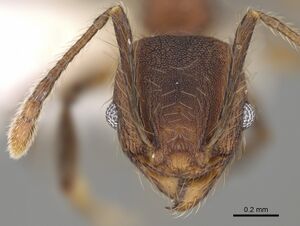Pheidole rima
| Pheidole rima | |
|---|---|

| |
| Scientific classification | |
| Kingdom: | Animalia |
| Phylum: | Arthropoda |
| Class: | Insecta |
| Order: | Hymenoptera |
| Family: | Formicidae |
| Subfamily: | Myrmicinae |
| Tribe: | Attini |
| Genus: | Pheidole |
| Species: | P. rima |
| Binomial name | |
| Pheidole rima Longino, 2019 | |
This species occurs in montane wet forest, where it can be locally abundant. It appears to be mainly arboreal. Minor and major workers recruit to ground baits. Workers occur in Winkler samples of sifted litter and rotten wood, in beating samples, and in Malaise traps. Multiple nests have been observed under epiphytes in treefalls. A nest was observed in live stems of an understory scandent shrub. One foundress queen, tentatively identified as this species, was found in a chamber in a clay bank.
Identification
Minor: face foveolate, overlain with faint reticulate rugulae; head flattened to slightly excavate behind; occipital carina thin, not visible in face view; promesonotal groove absent; pronotal humeri with short triangular tubercles; mesosoma entirely foveolate; propodeal spines about as long as posterior face of propodeum; gaster smooth and shining; abundant, flexuous, erect setae on mesosomal dorsum, tibiae, and gastral dorsum; bicolored, red head and mesosoma, contrasting black gaster.
Major: inner hypostomal teeth distinct, closely spaced, medial tooth also well developed; scape base terete; head somewhat cordate, posterior margin deeply excavate medially; scrobal spaces faintly impressed; face foveolate throughout, overlain with reticulate rugulae laterally and posteriorly, longitudinal rugulae medially between frontal carinae; propodeal spines about two thirds length of posterior face of propodeum; gastral dorsum smooth and shiny; abundant erect setae on face, sides of head, mesosomal dorsum, tibiae, and gastral dorsum.
Measurements, minor worker: HW 0.57, HL 0.62, SL 0.66, EL 0.13, WL 0.77, PSL 0.10, PTW 0.12, PPW 0.16, CI 92, SI 117, PSLI 17, PPI 134 (n=2).
Measurements, major worker: HW 1.13, HL 1.12, SL 0.71, EL 0.17, WL 1.00, PSL 0.13, PTW 0.19, PPW 0.25, CI 101, SI 63, PSLI 11, PPI 131 (n=2).
Measurements, queen: HW 1.07, HL 0.99, SL 0.74, EL 0.27, WL 1.76, PSL 0.10, PTW 0.32, PPW 0.54, CI 108, SI 69, PSLI 10, PPI 166 (n=1).
Pheidole rima (mountains of Veracruz and Oaxaca, Mexico, not including Sierra de Los Tuxtlas), Pheidole floricola (Sierra de Los Tuxtlas to Costa Rica), Pheidole caltrop (Panama), Pheidole pilispina (Panama), and Pheidole gilva (Peru) have a similar habitus. The minor worker is largely foveolate and the pronotal humeri are tuberculate. All the southern species are uniformly yellowish, while P. rima is bicolored, with red head and mesosoma, black gaster. The face of the minor worker of P. rima is uniformly foveolate, like P. caltrop, P. pilispina, and P. gilva. The face of P. floricola is a mix of foveolate and smooth sculpture. Pheidole rima and P. floricola are both arboreal species, and it is likely that P. caltrop, P. pilispina, and P. gilva are as well.
Distribution
Latitudinal Distribution Pattern
Latitudinal Range: 19.52279° to 19.52181°.
| North Temperate |
North Subtropical |
Tropical | South Subtropical |
South Temperate |
- Source: AntMaps
Distribution based on Regional Taxon Lists
Neotropical Region: Mexico (type locality).
Distribution based on AntMaps
Distribution based on AntWeb specimens
Check data from AntWeb
Countries Occupied
| Number of countries occupied by this species based on AntWiki Regional Taxon Lists. In general, fewer countries occupied indicates a narrower range, while more countries indicates a more widespread species. |

|
Estimated Abundance
| Relative abundance based on number of AntMaps records per species (this species within the purple bar). Fewer records (to the left) indicates a less abundant/encountered species while more records (to the right) indicates more abundant/encountered species. |

|
Biology
Castes
Worker
Minor
Images from AntWeb
   
| |
| Paratype. Worker (minor). Specimen code CASENT0646693. Photographer Michele Esposito. | |
Nomenclature
The following information is derived from Barry Bolton's Online Catalogue of the Ants of the World.
- rima. Pheidole rima Longino, 2019: 55, fig. 35 (w.q.) MEXICO.
Type Material
- HOLOTYPE: 1 major worker, Mexico, Veracruz: 8km WSW Xalapa, 19.52181 -96.98883 ±50 m, 1500 m, 5-Mar-2015, wet riparian forest, under epiphytes (J. Longino, JTL9185) [UNAM, unique specimen identifier CASENT0633307].
- PARATYPES: major, minor worker, dealate queen: same data as holotype [CAS, UNAM]; same data except 19.52279 -96.99104 ±20 m, 1500 m, 22-Jun-2016, 2nd growth cloud forest, nest in epiphytes (J. Longino, JTL9661) [MCZC, USNM].
Description
Etymology
In reference to Hudson's character Rima in Green Mansions, and the arboreal habit of this species.
References
- Longino, J.T. 2019. Pheidole (Hymenoptera, Formicidae) of Middle American Wet Forest. Zootaxa 4599: 1–126 (DOI 10.11646/zootaxa.4599.1.1).
- Vázquez-Franco, C.M., Morrone, J.J. 2022. The genus Pheidole (Hymenoptera: Formicidae: Myrmicinae) in Puebla, Mexico. Revista Mexicana de Biodiversidad 93: e933820 (doi:10.22201/ib.20078706e.2022.93.3820).
References based on Global Ant Biodiversity Informatics
- Longino J. T. 2019. Pheidole (Hymenoptera, Formicidae) of Middle American wet forest. Zootaxa 4599: 1-126

